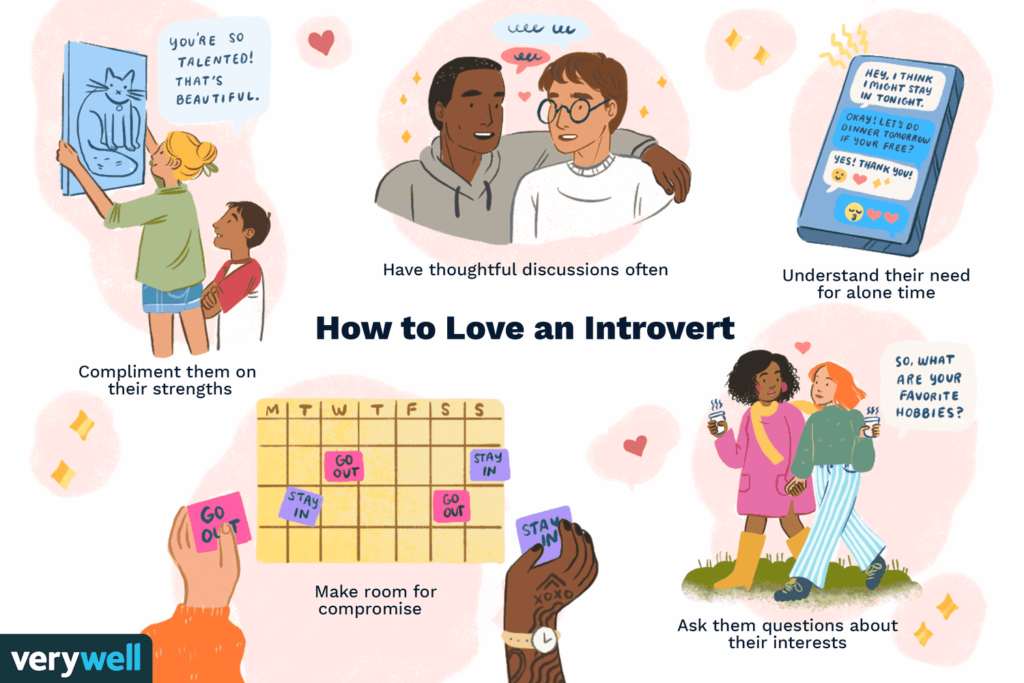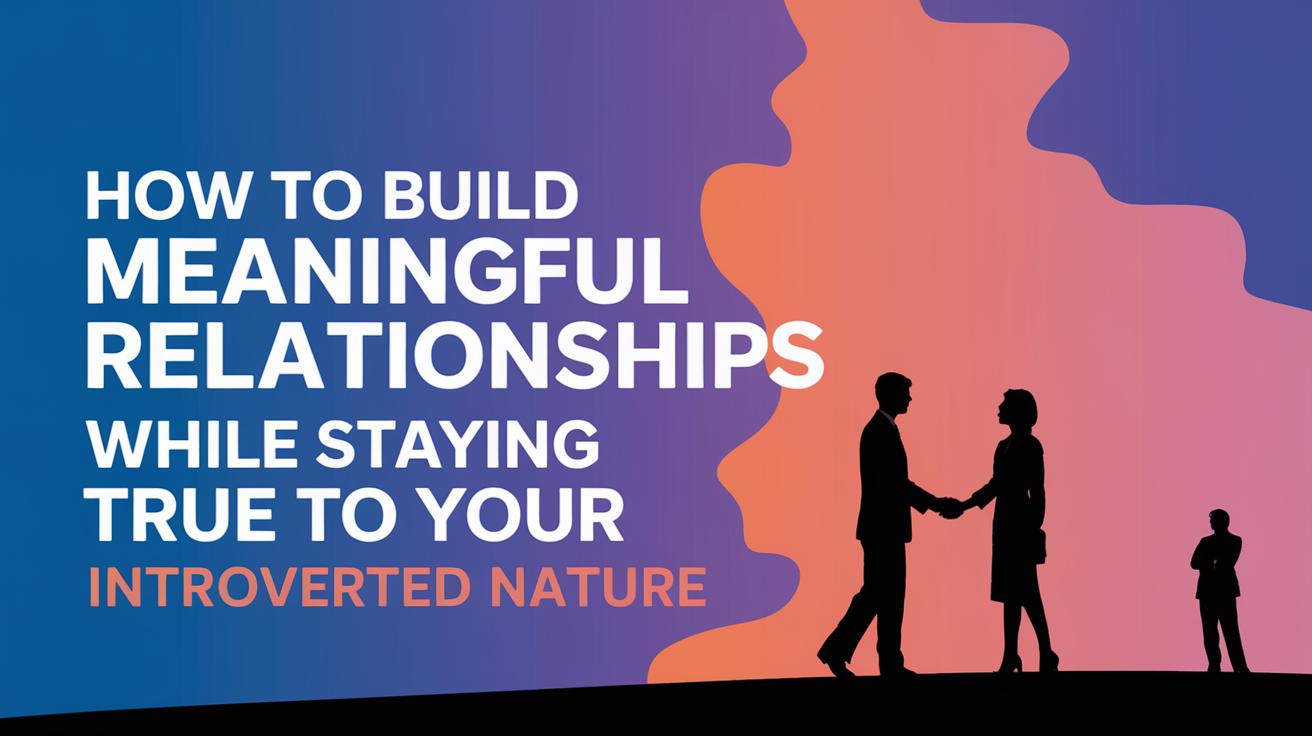Building meaningful relationships can be challenging for introverts. It’s important to stay true to yourself while connecting with others. Introverts often feel drained by social interactions. They need time alone to recharge. But this doesn’t mean they don’t value deep connections. If you’re introverted, you might wonder how to build relationships without feeling overwhelmed. The good news is, it’s possible.
With the right approach, you can form strong bonds while respecting your need for solitude. In this guide, we’ll explore practical tips to help you connect with others. You’ll learn how to be genuine and comfortable in social situations. Stay tuned for strategies that will make socializing easier and more meaningful for you.

Introversion And Authentic Connections
Introverts often find social interactions draining. Yet, they crave deep and meaningful relationships. This guide helps introverts stay true to themselves while building authentic connections.
Understanding Introversion
Introversion is not shyness. It’s a preference for less stimulating environments. Introverts gain energy from solitude. They often need time alone to recharge.
Understanding this can help you explain your needs to others. Being honest about your introversion can lead to more respect and understanding from friends and family.
Importance Of Authenticity
Authenticity is key for introverts. Pretending to be outgoing can feel exhausting. Be yourself and find people who appreciate you for who you are.
Here are some tips to stay authentic:
- Be honest about your need for alone time.
- Engage in activities you genuinely enjoy.
- Choose quality over quantity in friendships.
- Set boundaries and communicate them clearly.
These steps help you create deeper, more meaningful connections.
Embracing Your Introverted Nature
Embracing your introverted nature is the first step to building meaningful relationships. Many introverts feel pressure to change themselves to fit in. But, being true to who you are is key to forming genuine connections. This means understanding and valuing your own traits.
Self-acceptance
Self-acceptance is crucial for introverts. Recognize that your quiet nature is a strength. Accepting yourself means you won’t feel the need to act differently. This authenticity attracts the right people into your life. People who appreciate you for who you are.
Self-acceptance also reduces stress. You won’t feel pressured to be someone you’re not. This makes social interactions more enjoyable. You’ll be more relaxed and confident. This confidence helps in forming deeper bonds.
Identifying Strengths
Introverts have unique strengths. Identifying these can help you build strong relationships. One strength is the ability to listen well. Good listening skills make others feel valued and understood. This is a key component in any relationship.
Another strength is thoughtfulness. Introverts often think deeply before speaking. This leads to meaningful conversations. People appreciate this depth and it helps in forming lasting connections. Knowing your strengths can boost your confidence in social settings.
Building Self-awareness
Building self-awareness is essential for introverts who want to build meaningful relationships. Knowing yourself helps you understand your limits and strengths. This self-knowledge allows you to interact more authentically and comfortably with others.
Recognizing Social Energy Levels
Recognizing your social energy levels helps you manage your interactions. Introverts often need alone time to recharge. Pay attention to how you feel after social events. Do you feel drained or energized?
Track your energy levels:
- Before a social event
- During the event
- After the event
Keeping a journal can help. Note how long you can stay social before needing a break. This helps you plan future interactions better.
Setting Personal Boundaries
Setting personal boundaries is crucial for maintaining your well-being. Know what you’re comfortable with and communicate it clearly. Boundaries help protect your energy and mental health.
To set boundaries:
- Identify your limits.
- Communicate them politely but firmly.
- Respect your own boundaries.
Be consistent. If you need alone time, don’t hesitate to say so. People will respect your honesty and appreciate your need for space.
Choosing The Right Social Settings
Introverts often find social settings challenging. But choosing the right environment can make a big difference. By selecting the right places to connect, you can build meaningful relationships without feeling overwhelmed. Let’s explore how you can find the best social settings for your introverted nature.
Finding Comfortable Environments
Seek out quiet, calm places. Coffee shops or small cafes work well. They offer a relaxed atmosphere. Libraries are another great option. They encourage quiet conversations. Parks can also be soothing. Nature helps ease social anxiety.
Join small groups with shared interests. Book clubs or hobby groups suit introverts. They provide a common topic to discuss. This helps ease the pressure of making small talk.
Navigating Large Gatherings
Large gatherings can be overwhelming. Plan ahead if you must attend. Arrive early to adjust to the environment. Find a quiet corner to take breaks. This helps manage your energy.
Focus on one-on-one interactions. Seek out familiar faces. Deepen those connections. You don’t need to talk to everyone. Quality over quantity is key.
Set a time limit for yourself. Decide how long you’ll stay. This helps you avoid burnout. Leave when you feel tired. It’s okay to prioritize your comfort.
Effective Communication Strategies
Effective communication strategies are vital for building meaningful relationships while staying true to your introverted nature. By focusing on active listening and expressing yourself clearly, you can connect with others deeply. These strategies help you share your thoughts without feeling overwhelmed. Let’s explore how to implement these techniques.
Active Listening Skills
Active listening is more than just hearing words. It involves truly understanding the speaker. Nod your head or smile to show you are engaged. Maintain eye contact to build trust. Avoid interrupting while the other person is talking. After they finish, summarize their points to confirm understanding. This shows respect and attentiveness.
Ask open-ended questions. This encourages deeper conversations. For example, say, “How did that make you feel?” instead of “Did you like it?” Active listening helps you learn more about the other person. It also makes them feel valued and heard.
Expressing Yourself Clearly
Expressing yourself clearly is crucial for meaningful interactions. Use simple and direct language. Avoid using jargon or complex words. Speak at a comfortable pace. This ensures your message is easy to understand.
Practice using “I” statements to express your feelings. For example, say, “I feel happy when we talk” instead of “You make me happy.” This clarifies your emotions and reduces misunderstandings. Be concise. Stick to the main points to keep the conversation focused.
Non-verbal cues are also important. Your body language should match your words. Smile if you are sharing something positive. Maintain good posture to show confidence. These small gestures enhance your verbal communication.
Nurturing One-on-one Relationships
Building meaningful relationships can be challenging for introverts. The key is to focus on deep, one-on-one connections. This allows you to stay true to your introverted nature while fostering strong bonds.
Deep Conversations
Introverts often thrive in settings where they can have deep conversations. These meaningful exchanges help build connections. Start with subjects that interest you both. This could be books, movies, or hobbies.
Ask open-ended questions. These encourage the other person to share more. Listen actively to their responses. This shows that you value their thoughts and opinions.
Another way to deepen conversations is through storytelling. Share personal experiences that relate to the topic. This makes the conversation more engaging and relatable.
Building Trust Over Time
Trust is crucial in any relationship. For introverts, building trust can take time. Be patient and consistent. Show up when it matters. This helps in nurturing trust.
Communicate openly and honestly. This builds a foundation of trust. Avoid rushing the process. Trust grows through shared experiences and mutual respect.
Another way to build trust is through reliability. Follow through on your promises. This demonstrates that you are dependable. Reliability strengthens the bond over time.
Below is a simple table summarizing key points:
| Key Points | Description |
|---|---|
| Deep Conversations | Engage in meaningful topics and listen actively. |
| Building Trust | Be patient, consistent, and reliable. |
Remember, meaningful relationships are built over time. Focus on quality, not quantity.
Balancing Social Life And Solitude
Finding the right balance between social life and solitude is essential for introverts. They need to connect with others yet recharge alone. This balance ensures emotional well-being and personal growth.
Scheduling Downtime
Scheduling downtime is crucial for maintaining energy levels. Allocate specific times each day for quiet activities. These can include reading, meditating, or simply enjoying nature.
Use a planner or digital calendar to mark these periods. Treat them as important appointments. This helps create a routine that respects your need for solitude.
A sample schedule might look like this:
| Time | Activity |
|---|---|
| 7:00 AM – 8:00 AM | Morning Walk |
| 12:00 PM – 1:00 PM | Lunch Break (Solo) |
| 6:00 PM – 7:00 PM | Reading |
Avoiding Social Overwhelm
Avoiding social overwhelm is vital. Large gatherings can be draining for introverts. Opt for smaller, more intimate settings. This allows for deeper connections and less stress.
Set boundaries with friends and family. Communicate your limits clearly. For example, let them know you need to leave a party early or prefer one-on-one meetups.
Consider these tips:
- Plan social activities in advance.
- Limit the number of social events per week.
- Take breaks during long gatherings.
- Have a quiet space to retreat to.
Remember, it’s okay to say no. Prioritize your well-being. This ensures you enjoy social interactions without feeling overwhelmed.
Sustaining Long-term Connections
Building lasting relationships as an introvert can be challenging but deeply rewarding. Staying true to your nature while maintaining these connections requires conscious effort and understanding. This section explores practical ways to sustain long-term connections.
Consistent Effort
Consistency is key in any relationship. Regular, genuine communication helps build trust and understanding.
- Schedule regular catch-ups. Set reminders to check in with friends or family.
- Show genuine interest. Ask about their lives and listen actively.
- Share your experiences. Being open helps create a balanced relationship.
Even small gestures, like sending a thoughtful message, can make a big difference. The effort shows you care, even if it’s just a few words.
Respecting Mutual Needs
Respecting each other’s needs is essential for a healthy relationship. Understand that both parties have different preferences and boundaries.
| Introvert Needs | Extrovert Needs |
|---|---|
| Quiet time | Social interaction |
| Space for reflection | Spontaneous outings |
| One-on-one time | Group activities |
Balancing these needs ensures both parties feel valued and respected. Communicate openly about what you need to feel comfortable and engaged.
Respect boundaries. If your friend needs space, give it without taking it personally.
Adapt activities. Find common ground that suits both your preferences.
Building meaningful, long-term relationships as an introvert is possible with consistent effort and mutual respect. It strengthens your bond without compromising your true self.
Conclusion
Building meaningful relationships as an introvert is possible. Stay true to yourself. Understand your needs and boundaries. Connect with like-minded individuals. Spend quality time, not quantity. Listen actively and share when comfortable. Small steps lead to strong bonds. Celebrate your unique way of connecting. Embrace who you are.

